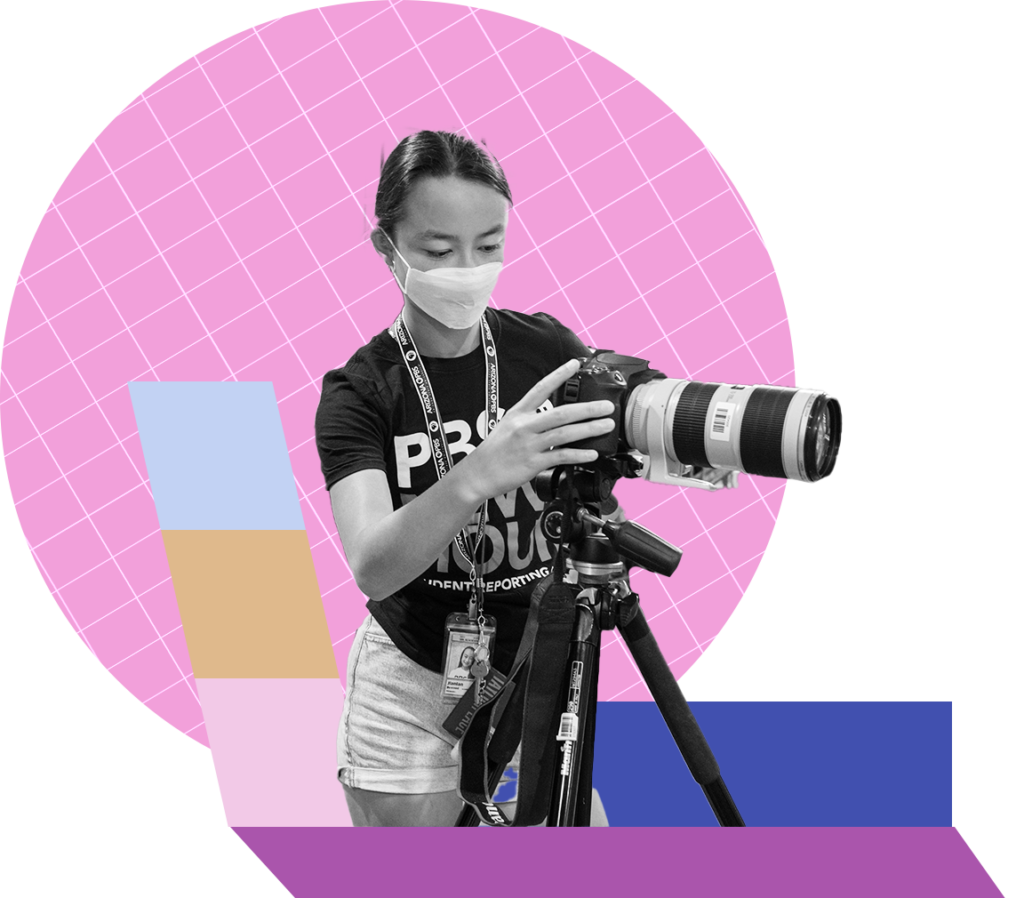PLEASE NOTE: the 2022 Student Journalism Challenge closed for submissions on December 2, 2022. Winners will be announced by early March, 2023.
How is school preparing you for your future? What’s working? What could be done differently? How is education adapting to our changing world? What do you want from your education that doesn’t currently exist?
Welcome to the PBS NewsHour Student Journalism Challenge.
This is your chance to get published and win prizes! The challenge is for everyone ages 13-18 to use your curiosity and critical thinking to reflect on the education you’ve had and the opportunities you want for future generations.Individuals or teams can submit ORIGINAL print, audio, or video pieces that respond to the theme of “My education, my future” (read more below!) Please note that an adult (teacher, after-school program or club advisor, parent, etc.) must submit on behalf of any student under age 18. The submission form will go live on this site on September 22, 2022.
All entries will be evaluated by a panel of professional journalists using a rubric to assess excellence in content, execution, and creativity. Ten finalists will be selected in each of the categories of print, video, and audio, and two winners will be selected in each category. Winning entries will be published and promoted on PBS Newshour Student Reporting Labs platforms and channels, participating local PBS stations, and XQ. Print winners will also be published on the Forbes.com Well Beings Blog. Winners will also receive prizes, mentoring opportunities and a $250 gift card!
The deadline to submit your entry is December 2, 2022 at 11:59 p.m. ET. Winners will be announced in early 2023.

There are three categories for this challenge: print, audio, and video. Please note that each student can only submit an entry in ONE category. All submissions must be newly produced and created between August 1 and December 2, 2022. (Yes, it’s okay if you’ve already published in your school or other publication!)
How will they be judged? Find the evaluation rubric here!
This should be a written piece of journalism. It could be a report, a feature article, an explainer, etc. The word limit is 500 words. How will they be judged? Find the print-specific rubric for evaluation here.
- Example: Reupholstering behind bars: Massachusetts prisoners repair auditorium chairs
- Example: LAUSD school bus driver shortage leads to reduction in routes, longer rides (from LA Times HS Insider)
- Example: Opinion: How bilingual education benefits immigrants and the nation (from LA Times HS Insider)
AUDIO
This might be a two-way interview, a reported piece with multiple interviews and audio scenes, etc. Audio pieces should be no longer than 4 minutes. Accepted file types include .aiff or .wav. How will they be judged? Find the audio-specific rubric for evaluation here.
- Example: Excerpt from On Our Minds
- NPR Student Podcast Challenge Winner – After a lockdown, students found comfort in humor, but what are the jokes hiding?
VIDEO
This can be an interview, a news package, an explainer, etc. Videos should be no longer than 4 minutes. All entries must be uploaded to YouTube or Vimeo and submitted using that link. All interviewees appearing on camera need to sign a media release form which they will receive via email as part of the submission process (see the form preview for a sneak peek.) Please note that graphics (lower thirds, etc.) are welcomed! How will they be judged? Find the video-specific rubric for evaluation here.
- Example, news package: Philadelphia students and teachers fight for safer conditions after asbestos exposure in school
- Example, explainer: Why these student reporters wanted to go to school board meetings
All media created should respond to the theme: My education, my future. This can include exploring some of the big questions and topics below: How is school preparing you for your future? What’s working, and what’s not? How is education adapting to our changing world? What do you want from your education that doesn’t currently exist? Some ideas to consider:
- Classes that help prepare you for life after high school
- The effects of the pandemic on education
- School safety
- The roles your school plays in your community
- Education and democracy: how schools prepare students to be informed citizens
- How do school districts spend money, what are your school’s priorities and who makes the decisions?
- Equity in education
- Where do you see creativity, innovation and dignity in education?
- How does increased use of social media impact students and education?
- LGBTQ+ and education
- Learning about race and racism
- Public schools, Charter schools, Independent schools, etc.
- How are students learning digital literacy in an era of globalized social media messages?
- Changes in work and career paths
- In what ways are students prepared (or not prepared) for the interconnected world economy?
- DACA, immigration and education impacts
- Indigenous communities
Reporting strategies to consider:
- Read/watch/listen to news stories about topics that interest you. Explore how those issues are unfolding in your own community.
- Cover a school board meeting, school leadership meetings, or educator professional development sessions.
- Talk to people around you– your family, friends, neighbors, teachers. Ask younger people, older adults, and your peers. What issues do they care about? What questions do they have?
- Review the school budget – what are the priorities and how does student perspectives inform spending decisions?
- Interview a student leader
- Look up local education reporting and email the journalist covering schools – either for the radio, television or print. Ask if you can talk to them about important stories that students should pay attention to.

